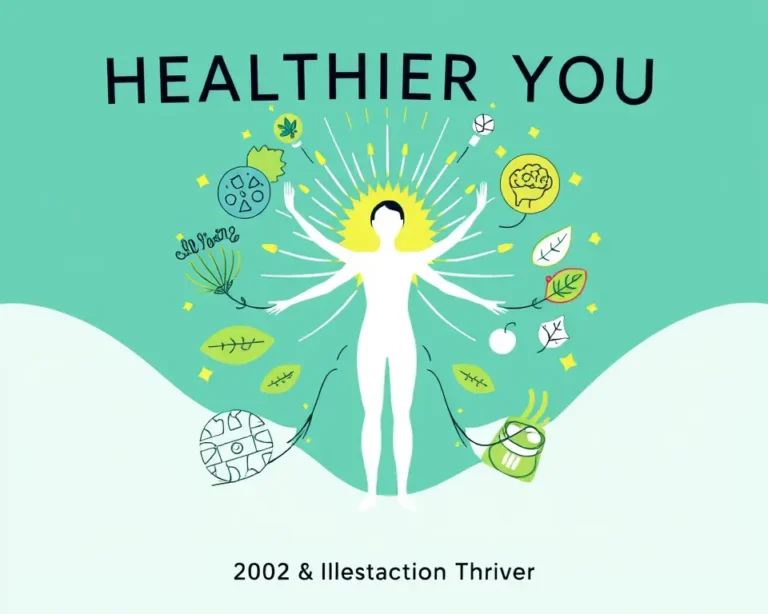Embarking on a journey to better health can feel overwhelming, but with the right guidance and achievable goals, 2025 can be your healthiest year yet. This guide will provide you with the latest insights and actionable strategies to help you stay on track with your health and wellness aspirations. From personalized nutrition and mental wellness techniques to leveraging cutting-edge wearable technology and sustainable self-care practices, we’ll cover every aspect of well-being.
Personalized Nutrition: Fueling Your Body’s Unique Needs
In 2025, the concept of “one-size-fits-all” nutrition is outdated. Personalized nutrition is gaining traction as people realize that their bodies have unique needs based on genetics, lifestyle, age, and specific health goals.[6, 19, 21] This approach involves tailoring your diet to address individual “need states,” such as joint, bone, gut, cognitive, and heart health.[19]
The Rise of Targeted Nutrition
- Genetic makeup, metabolism, and lifestyle: Personalized nutrition takes into account your genetic predispositions, metabolic rate, and daily activities to create a customized dietary plan.[21]
- Addressing specific health needs: Whether you’re looking to improve your heart health, boost your cognitive function, or support your gut microbiome, personalized nutrition can help you achieve your goals.[19]
- AI-powered insights: Artificial intelligence (AI) plays a crucial role in analyzing data and providing real-time insights into your sleep patterns, stress levels, and other factors that impact your health, allowing for smarter and more effective nutritional support.[10, 19]
- Biological data tracking: Wearable devices and mobile apps enable you to track your biological data, making it easier to make informed choices about your diet and lifestyle.[19]
Key Ingredients and Products to Watch
- Creatine: Increasingly popular among Gen Z for mental wellness and Baby Boomers for anti-aging benefits, creatine supplements support muscle growth, performance, and cognitive function.[6, 21]
- Superfoods: Ingredients like spirulina, matcha, moringa, maca root, ashwagandha, and flaxseed are gaining traction for their ability to support energy levels, immunity, hormonal balance, and overall well-being, especially for women.[6, 21]
- Collagen peptides and Omega-3s: These ingredients are essential for joint, bone, and heart health.[19]
- Probiotics and Adaptogens: These ingredients are beneficial for enhancing gut health and managing stress.[11, 19]
Personalized Nutrition in Practice
- Consult with a nutritionist: A registered dietitian or nutritionist can assess your individual needs and create a personalized meal plan tailored to your specific goals.
- Utilize wearable tech: Wearable devices can track your activity levels, sleep patterns, and other vital statistics, providing valuable data to inform your nutritional choices.[1, 13]
- Consider a genetic test: Genetic testing can reveal insights into your predispositions for certain health conditions and nutrient deficiencies, helping you optimize your diet accordingly.
Mental Wellness: Nurturing Your Mind and Emotional Resilience
Emotional and psychological well-being is just as crucial as physical health. In 2025, prioritizing mental wellness involves adopting positive habits and mindsets that help you navigate stressors, build meaningful relationships, and maintain resilience.[5, 18]
Strategies for Building Emotional Resilience
- Mindfulness and Meditation: Practicing mindfulness can help you manage stress, improve focus, and stay present. Incorporate guided meditation sessions, quiet rooms, or mindfulness apps into your daily routine.[5, 9]
- Micro-Mindfulness: Take short moments during the day to breathe deeply or notice your surroundings.[5]
- Digital Detoxing: Spend a day offline to reconnect with yourself and your environment.[5]
- Regular Physical Activity: Exercise releases endorphins that combat stress and improve mood. Organize company-sponsored wellness activities or offer digital fitness programs to encourage regular movement.[5, 9]
- Prioritize Sleep: Aim for 7-9 hours of quality sleep each night to refresh your body and mind. Establish a tech-free hour before bed and create a relaxing bedtime routine.[5, 16]
- Cultivate Positivity: Focus on gratitude and growth to build a positive mindset. Keep a gratitude journal, forgive yourself for mistakes, and reframe setbacks as learning opportunities.[5, 9]
- Social Connection: Nurture strong relationships and feel a sense of belonging by planning frequent meetings with family and friends.[5, 16]
- Establish Boundaries: Protect your energy by setting clear boundaries in both personal and professional relationships.[16]
Leveraging Technology for Mental Wellness
- Mental Health Apps: Apps like Calm and Headspace can guide you to moments of peace, even in a busy schedule.[5]
- AI-Powered Support: AI tools can analyze data to identify risk factors, support ongoing care, and improve patient outcomes.[24]
Addressing Mental Health Challenges
- Early Intervention: Knowing when to seek professional help or encouraging a loved one to do so can significantly change the trajectory of someone’s mental health journey.[18]
- Destigmatize Mental Health Issues: Open dialogue and transparency can reduce shame and promote understanding.[18]
- Holistic Care: Integrative therapies like mindfulness, meditation, and creative expression can broaden the scope of treatment and offer more ways to restore balance.[18]
Wearable Health Tech: Your Personal Health Assistant
Wearable technology is revolutionizing how we monitor and manage our health. These devices go beyond basic fitness tracking, providing actionable data to enable individuals to take control of their daily health.[1, 4, 13]
Key Wearable Technology Trends in 2025
- Generative AI: AI is transforming wearables by enabling advanced features like health scoring, personalized recommendations, and conversational virtual assistants.[3]
- Advanced Sensors: Wearables now feature advanced sensors for ECG, blood oxygen, and sleep monitoring, making them indispensable for health-conscious consumers.[3]
- Real-Time Monitoring and Predictive Analytics: Companies are moving beyond simple data collection and focusing on real-time monitoring and predictive analytics to help users take proactive control of their health.[14]
- Integration with Health Platforms: Wearables are seamlessly integrating with health platforms like EHRs, enabling more holistic body and mind care.[13]
Top Wearable Devices for 2025
- Apple Watch Series 9: Known for overall health tracking.[1]
- WHOOP 4.0: Focuses on recovery and readiness, ideal for athletes and fitness enthusiasts.[1]
- Oura Ring Gen 4: Tracks sleep, readiness, and overall wellness using heart rate variability, temperature trends, and movement.[1]
- Garmin Forerunner 965: Offers precision GPS, advanced performance analytics, and real-time stamina tracking for runners and triathletes.[1]
- Samsung Galaxy Watch 6: Best for Android users.[1]
Maximizing the Benefits of Wearable Tech
- Track Your Activity Levels: Monitor your daily steps, distance, and calories burned to stay active and achieve your fitness goals.
- Monitor Your Sleep Patterns: Use sleep tracking features to identify areas for improvement and optimize your sleep hygiene.
- Monitor Vital Signs: Keep track of your heart rate, blood pressure, and blood glucose levels to detect potential health issues early.
- Utilize Personalized Insights: Take advantage of AI-powered insights and personalized recommendations to optimize your workouts and dietary choices.
Sustainable Self-Care: Nurturing Yourself and the Planet
As the wellness industry evolves, sustainability has become a critical focus. Eco-friendly self-care has surpassed being a trend and has become a lifestyle as a way to reduce environmental impacts from our consumption.[4, 11]
Key Principles of Sustainable Self-Care
- Eco-Friendly Products: Choose sustainable products with refillable or biodegradable packaging.[11]
- Reduce Consumption: Minimize your consumption of disposable products and opt for reusable alternatives.[11]
- Support Ethical Brands: Support brands that prioritize sustainability and ethical practices.
- Connect with Nature: Spending time in nature reduces stress and anxiety, improves sleep quality, and increases access to vitamin D.[8]
Incorporating Sustainable Practices into Your Daily Routine
- Replace Disposable Products: Swap disposable products with reusable and refillable ones, like bamboo toothbrushes or reusable water bottles.[11, 22]
- Choose Eco-Friendly Skin Care: Opt for skin care products with refillable or biodegradable packaging.
- Practice Mindful Consumption: Be conscious of your consumption habits and make choices that align with your values.
- Spend Time in Nature: Surround yourself with nature to reduce stress and improve your overall well-being.[8]
Additional Tips for a Healthier 2025
- Set Achievable Goals: Establish realistic health goals and break them down into manageable steps.[7, 22, 25]
- Cut Back on Unhealthy Habits: Identify one unhealthy habit in your diet or routine and commit to reducing or eliminating it.[7]
- Take Charge of Your Screen Time: Introduce “tech-free hours” to your routine to focus on hobbies, connect with family, or enjoy uninterrupted rest.[7]
- Book a Preventative Health Check: Schedule a general health check to review your overall health and address any concerns early.[7]
- Stay Hydrated: Drink at least eight glasses of water daily to maintain optimal bodily functions.[16, 22]
- Embrace Lifelong Learning: Make time for reading, hobbies, and self-care to stimulate your brain and reduce stress levels.[7, 16]
By incorporating these strategies into your daily life, you can make 2025 a year of significant progress toward your health and wellness goals. Remember, it’s about making sustainable changes that you can maintain over the long term. Start small, stay consistent, and celebrate your achievements along the way. Here’s to a healthier and happier you in 2025!







